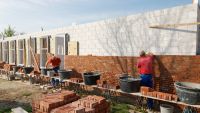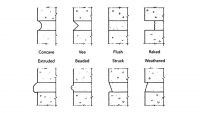The Good, the Bad, and the Ugly
How quality inspection can promote the industry’s image
The construction boom that America has been experiencing over the last several years has created overwhelming markets for mason contractors. But this prosperity has also brought with it a rash of contractors less skilled in providing a quality construction project. Recently a popular topic of discussion in national and local media is quality construction. Obviously it is the responsibility, and in the best interest, of the mason contractor to do the best job possible in constructing masonry structures. However, it is also the responsibility of the inspector to ensure that a quality project is constructed. An important part of any construction project is inspection. Therefore, the inspector's role is very important, relying heavily on their knowledge and good judgment, which are critical to obtaining a structurally sound and functional project. Traditionally, the inspector and the contractor have been adversaries, however times are changing. In a time where other competitive building materials are at their strongest, the mason contractor needs to ensure that the project is of highest quality and is cost effective in the long run. Quality inspection can help achieve this goal.
A large piece of the quality puzzle is the inspection process. Because contractors recognize quality construction, it is in their best interest to make sure that their inspectors are equally educated in masonry. One group working to educate inspectors is The Masonry Society (TMS) which has formed a subcommittee to develop a training program that can be adopted at the local level to perpetuate the education of building inspectors. How does this affect the contractor? As more qualified building inspectors are educated in masonry, the easier the inspection process will go, and ultimately result in the highest quality masonry construction project. To ensure that masonry will maintain its status as the premier building material, efforts must be made to bridge the gap between the building inspector and the mason contractor.
In an interview with Chicago based home inspector Steve Hier, Masonry explores some common issues in masonry inspection from a private inspector's view, and how some of these everyday problems can be avoided.
Masonry: As a general home inspector, how much masonry construction do you inspect?
Steve Hier: I'd say 75-80% of the new construction that I inspect is masonry. I primarily inspect single family homes, small condominium/townhouse complexes, and small commercial buildings. In the Chicago area, both structural and veneer masonry are very popular in the condominium and townhouse markets.
Masonry: How did you acquire your knowledge about structural and veneer masonry?
Hier: I recognized where the Chicago market was blossoming with masonry in its new residential construction. I took it upon myself to learn about structural and veneer masonry through correspondence with the National Concrete Masonry Association (NCMA), Masonry Advisory Council (MAC) and some other local masonry promotional groups. I also have quite a few NCMA TEK Notes in my library. Currently, I am preparing to take ICBO's exam for Certification as a Special Inspector of Structural Masonry.
Masonry: At what stage of a construction project are your services contracted, and for whom do you work?
Hier: In Chicago, the city building inspectors review the architect/engineer's drawings. They then issue the building permits from those drawings. I am a third party inspector that is usually hired by the buyer at the time of the contract negotiations. On occasion, realtors utilize my services.
Masonry: Split-face concrete block has been a major concern in Chicago's newspapers recently. What seems to be some of the problems?
Hier: Split-face concrete block has been the source of attacks because of the very expensive townhomes that are experiencing some leakage and drainage problems located in the masonry detailing. Most of the problems initiate from lack of proper drainage detailing by the designer, lack of appropriate installation of this detailing, or poor workmanship by the contractor.
Masonry: Could you be more specific in respect to the drainage detail problems?
Hier: The most prevalent problems occur in untreated concrete masonry, poor joint pointing, flashings and weep detailing, especially around openings such as doors and windows. Untreated concrete will absorb tons of water. Poor joint detailing will negate any water repellant. Flashings and weepholes represent measures to control moisture in walls above ground level. These details are very dependent upon each other. Weepholes will not work without the proper flashing, and flashing means little without weepholes. I am seeing the same few problems occur time and time again. Either one of, or a combination of, these problems arises in 25% of all new construction I inspect, which causes million dollar homes to have drainage problems.
Masonry: Have you noticed any problems with the actual concrete masonry unit (cmu)?
Hier: No. The drainage problems occur when the concrete masonry unit is untreated. Concrete by nature absorbs water. That being the case, the developer, designer, and the contractor all need to, as a team, make sure that the concrete block is treated with a water repellent, NOT a water sealant.
Masonry: What is the difference between water repellant and water sealant for concrete masonry units?
Hier: Water sealants actually do more harm than good. Concrete needs to breathe. So when a sealant is applied, the concrete forces the water into the structure rather than allowing it to evaporate outside the structure. This makes the concrete blocks spall, leaving unsightly holes in the exterior of the structure. A water repellent, on the other hand, does not allow water into the cmu, but permits water to evaporate out of the exterior surface without any damage. A potential problem occurs when the developers place a sealant on the wall thinking that this will seal the wall, when actually they are destroying it. Almost all concrete blocks that are sealed will eventually have some water seepage and aesthetic issues.
Masonry: Do you think there is a shortage of qualified building inspectors?
Hier: The key word is "qualified". There are surely enough city and private building inspectors in this area, but very few are properly trained in masonry and masonry detailing. This immediately places the entire masonry system at a disadvantage. Until the general building inspectors in non-West coast areas are properly trained, there will remain a shortage of qualified building inspectors of masonry. Because of the stage in which I enter the construction process, the City's building inspectors have already inspected the site. However, I still see very basic problems in masonry that could have been avoided had the original inspector been properly trained to recognize common masonry detailing issues. Most city building inspectors have little experience with construction, let alone masonry. I am not going to say that you absolutely need construction experience, but it sure is helpful.
Masonry: In summary, what can be done to avoid drainage problems due to improper detailing, installation and inspection of masonry?
Hier: Everyone involved in the project needs to take responsibility for their portion, and do things correctly. Responsibility should be divided at pre-construction meetings. Most drainage problems can be avoided if the developer, designer, and building inspector were all properly trained on masonry details. The developers and designers need to make sure that the correct masonry details are specified on the job drawings and specifications, and the contractors need to make sure that they are installing the specified details correctly. Contractors usually know when something is omitted and in those instances, they need to speak up, because ultimately they are the ones who will take most of the blame.
Opportunities and challenges await the industry. With a corps of inspectors lacking the necessary skills need to inspect masonry construction systems, a more concerted effort must be waged to train these inspectors who inavoidedly can be allied with the masonry industry. Additionally, if the construction boom continues, increased focus must be given to educate both the contractor and the customers to make them more aware of what to look for when choosing a quality mason contractor.
Steve Hier is the President and Owner of Miller-Hier Enterprises, Inc, a home inspection and consulting company. Mr. Hier has a BS in Mechanical Engineering from South Dakota School of Mines and Technology and has worked in a variety of engineering and management positions for US Steel, and US Army Corps of Engineers. He has also owned and operated his own general contracting and home construction company before becoming a home inspector. He is a certified member of the American Society of Home Inspectors (ASHI).
About the Author
Rashod R. Johnson, P.E., is president of The Roderick Group in Chicago. He is the former Director of Engineering for the Mason Contractors Association of America and currently serves as a technical consultant to the association.


















